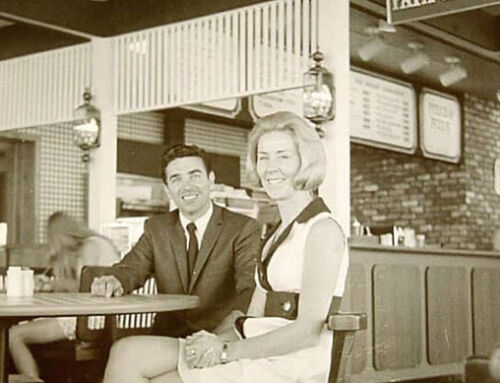Even if you are new to Southie or to Boston, I’m sure you’ve heard of the John Joseph Moakley Federal Courthouse and Moakley Park both of which are located here in South Boston. The courthouse is the site of all those Varsity Blue trials you keep hearing about (Felicity Huffman! Hot Pocket Heiress!) and Moakley Park is a 60-acre park that’s home to playgrounds, countless softball games, rugby matches, track meets and picnics, but you might not know the story of their namesake John Joseph “Joe” Moakley (1927 – 2001). That makes us here at Caught in Southie very sad, hence Congressman Joe Moakley is the subject of this History Lesson!
Joe Moakley was born in South Boston in 1927. In the 1930s, he and his family moved into the just built Old Harbor Housing Development, the first public housing development in New England. The 27-acre housing development was renamed in 1961 after Mary Ellen McCormack and it currently has more than a thousand housing units!
When World War II broke out, Joe Moakley lied about his age so he could enlist in the Navy. He was only 15 when he joined! He served in the South Pacific during the war. After, he was able to use the GI Bill to attend the University of Miami (while in school in Florida he earned money as a light heavyweight boxer, and was known as the Boston Bull!!!), and later received his law degree from Suffolk University Law School. He partnered in a law practice that had its office at 149 Dorchester Street.
Joe Moakley was a politician and he held many different offices during his career. Here’s the breakdown: Member of the Massachusetts House of Representatives for the 7th Suffolk District 1953–1963; member of the Massachusetts Senate for the 4th Suffolk District 1965–1971; member of the Boston City Council from 1971 to 1973; and member of the U.S. House of Representatives from Massachusetts’s 9th District 1973 – 2001. While in Congress he was Chair of the House Rules Committee from ‘89 – ‘95. Whew; what a career!
Moakley championed for South Boston and the people he represented. He secured funding for the Big Dig, helped to lay the foundations for what would transform into the vibrant South Boston Waterfront, secured funding for historic sites such as Dorchester Heights, the African Meeting House, and the USS Constitution, and he participated or led delegations to China, Ireland, Egypt, Israel, and Cuba.
One of the things he is most known for though, outside of Boston, was his commitment to the people of El Salvador. Refugees approached Moakley here in Boston and told him about the conditions in the war torn country in the 1980s, where thousands of people were being disappeared. Moakley was appalled and worked during the rest of his life to improve the lives of Salvadorians. He also formed what became known as the Moakley Commission. That was a congressional task force that investigated the 1989 murders in El Salvador of six Jesuit priests, their housekeeper, and her daughter.
Moakley was what was known as a “bread and butter” politician. He was accessible and visible in his community. Constituents felt seen and known by him. Ask most people who grew up here and I’m sure they have stories they would happily tell you.
Joe Moakley was in Congress during the era of busing. And that’s not something we can gloss over. In April of 2001, a month before his death, Kwame Holman from the PBS News hour interviewed Moakley. Here is part of that interview where he talks about his objection to busing and why people were protesting outside of his home:
“Well, it was because my people thought that I should be out in the streets, and screaming and hollering and railing people. And I said look, I’m against it, but I’ll do my work in the halls of Congress. But that wasn’t enough.
See, the whole thing was that the way that the remedy to busing was they were going to bus everybody from South Boston into Roxbury, and the school in each area, there was no difference. And there was just an exercise in futility. If they were going to bus them into areas where the school system was much better, fine. But this was just trying to equal the color situation by an artificial means, and there was no pot of gold at the end of it. The schools in Roxbury were no better than the schools in South Boston.”
And here he speaks about public service:
“Public service, you know, is the ability to help the most vulnerable in our society. And if you represent an area that has a lot of blue-collar workers, you’re going to get a lot of people who are going to need your help.”
Joe Moakley helped many, many people during his lifetime of service and his impact can be seen throughout the neighborhood. The park in his name is going through a major redesign soon. The goal is to increase recreational opportunities and respond to coastal flooding risks. You can check out the Moakley Park Vision Plan here!
Image via Boston Globe archives.






Thank you for remembering a good man who never forgot where he came from. He lived to serve the constituents in his district that he always understood he was truly privileged to represent.
Fred Clark
Joe Moakley’s District Director